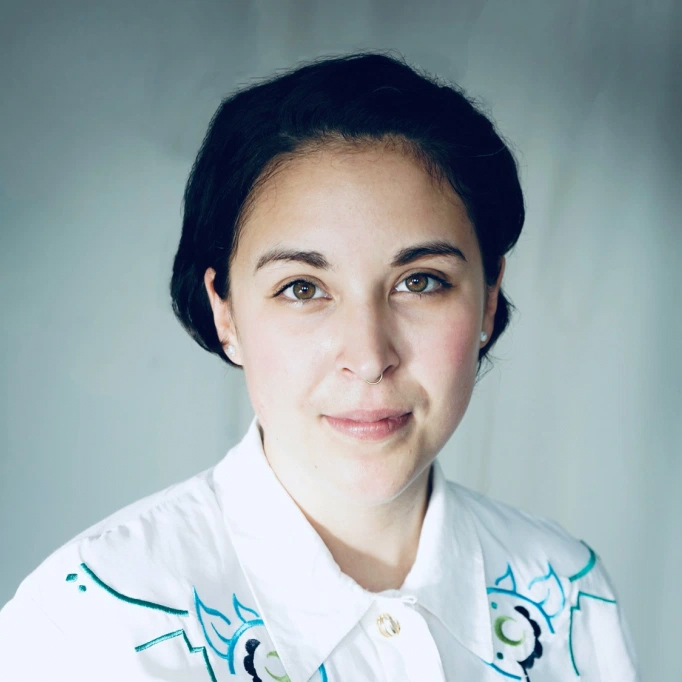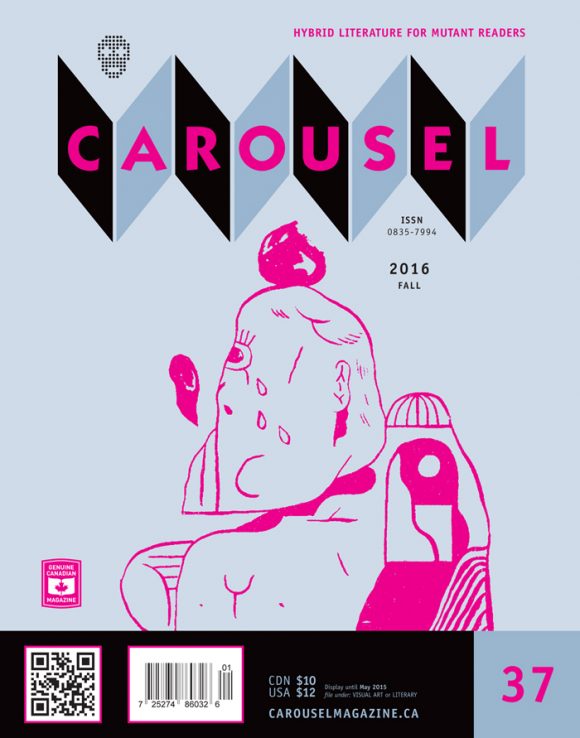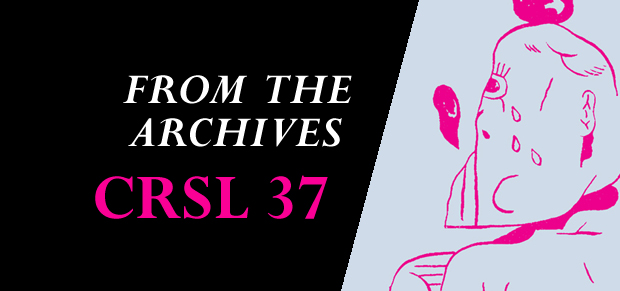From the Archive: Mallory Tater (CAROUSEL 37)
MALLORY TATER
The Last Nickel
Geraldine’s black bather sticks to her chapped skin. Her thighs burn rogue with saltwater rashes. The water isn’t good to her but she loves it anyway. She walks her path to the seawall, one-at-a-times each stone step down to the shore. She feels a shifting in the land, but she isn’t afraid of it. Kelp and purple claw-weed accumulate in bundles, thick and dirty like doll’s hair. Geraldine wades until she is waist-deep then she slips under, eyes open. She swims every night at nine with her dead friends whose ashes are all scattered here. She likes to hear their voices — Marianne’s shrill laughs in abandoned hermit shells, Alice’s insults in the form of barnacles snagging her ankles. Today she only hears Rudy. Geraldine surfaces. The sky starts closing in. She licks the ocean off of her upper lip. All good storms start with heat in the palms. Then air thickens and churns, rests a viscous fog on the planes of her shoulders, under the nape of her knees. Geraldine falls asleep on the couch in her wet bather listening to her pounding head, one finger lined between each rib as if they are piano keys, as if the gaps in her hold music.
Post-storm and Geraldine awakes to The Last Nickel eight inches flooded and her body is so cold. She accepts the freezing in every season but summer, has grown used to seeing her own breath in the living room even with the fireplace ablaze, but not like this. She lives an hour outside of Whatcom. She has never appointed anyone to help her with the place, not wanting to spend a dime for someone to sleep in the spare room, use her hot water, raid the pickled items in her fridge. She lets the yard overgrow except for the front row of delphiniums neatly trimmed by the picket fence, the small, dirt path leading down to the seawall that she rakes, and her veggie garden. The storm tides have washed it all away and only a few petals stick to the fencing, dyeing the wood a soft pink. Geraldine once read a magazine article on reincarnation and decided that when the sun is shining and she’s had her morning coffee, Marianne is her delphiniums. But Marianne is not anywhere in sight today. She always did hate bad weather.
Geraldine hates cooking but when Rudy died she learned his recipe for sugar-crusted bran muffins that kept them both regular. She bakes half a dozen every Sunday evening and they last her a week until the following Sunday in which she makes herself a steak omelette to feed the carnivore in her. The Last Nickel’s foundation is uneven so the slanted kitchen is flooded by the storm. Geraldine cannot break routine; she pulls out the recipe card in Rudy’s all-caps writing with asterisks in places where he had forgotten things — POWDER NOT SODA, CHOCO CHIPPERS TO TASTE. She mixes the batter, standing ankle-deep in water. Her cupfuls of flour are too generous and she breaks the egg too quickly. Pieces of shell float in the kitchen and she stares down at the growing translucency of the water, contaminated by the domestic.
Nature overstays its welcome. Strewn bits of kelp cling to Geraldine’s welcome mat. Old issues of All Point Bulletins, set aside for kindling, sop like wet dishcloths. Part of Geraldine is tempted to wipe her mugs with them to make an imprint of Thursday’s tide charts and the Lutheran Church bake sale review. Geraldine does not add brown sugar, does not grease the muffin tin, dry and lonely on the dish rack from last week. She wades to the chesterfield in the living room and swallows to the ticking of clocks, frequent and unnerving. The gears in her head grind and they, too, feel the ache and begin to rust. She removes her heavy jewellery — queen-beaded bracelet and grass knuckle pendant. Her bather is not yet dry. She is cold, but she wants to be. She watches the mosquitoes on the ceiling circle above the light, smell the sugar in her, then descend to taste it. She lets them. She is too tired and she is mostly meatless.
The storm has brought Geraldine’s headaches back in a heated patch under her ears. It wraps around her head in a hot sting. Rudy tried everything on her when he was alive. He used to dapple lavender oil on both of their wrists, place Geraldine in their clawfoot tub and would try to make everything quiet. He quieted the natural light through the window by taping up bed sheets. There were no curtain rods and Geraldine thought blinds were domestic prison bars. Rudy would let her soak and she’d hear him collect all of the clocks. He would sit on the bathroom floor with all six, permanently dust coated heirlooms from his uncle, with roman numerals and more hands than were necessary. Geraldine hates those clocks. No one should count seconds. Rudy would pry their backs off with a butter knife until everything was perfectly muted all except their breathing and the dissolving of crisp bath bubbles as they settled on Geraldine’s body. Rudy would not calm until her pain did. Now Rudy is ash and Geraldine is mad with the ticking. She walks back toward the seawall, allows the water to soak her ankles, allows the mosquitoes to devour her further.
The sky slips open right above the border marker out to sea and Geraldine finally admits to herself that Whatcom is cursed. She doesn’t see anyone for miles, can only see the bugs, souring her ears with their sound. She begins to itch, begins to panic thinking of their saliva in her veins. They overpower Rudy’s voice singing a song about how the world is round and no one can feel it. Geraldine can’t remember the name of it or who wrote it but she remembers hearing it on the radio twenty-nine years ago when they decided to plant the garden, build the fence around it. Most of her memories come with colour. The memory is Rudy, thin boned and balding, holding his trough, carefully patting soil over the bulbs. The memory is onion-white and perfect. Geraldine wades to the shoreline through the blackness, cannot see her toes, can only see bugs gnawing her knobbly, naked legs. She has cut herself on sand dollar bones. She wishes she could smell her blood to remind her that she isn’t dead, that the rhythm in her head distorting her vision, plaguing her soul, is the drumbeat of a well lived life. She palms her cheeks, feels the fresh bumps, then thinks of Rudy’s skin and how dry it was, but he never did anything about it. Geraldine lies in the sand, buries her body in a damp coating of it, tries to hide herself from the bugs, the tide, the air.

The Last Nickel
appeared in CAROUSEL 37 (2016) — buy it here

